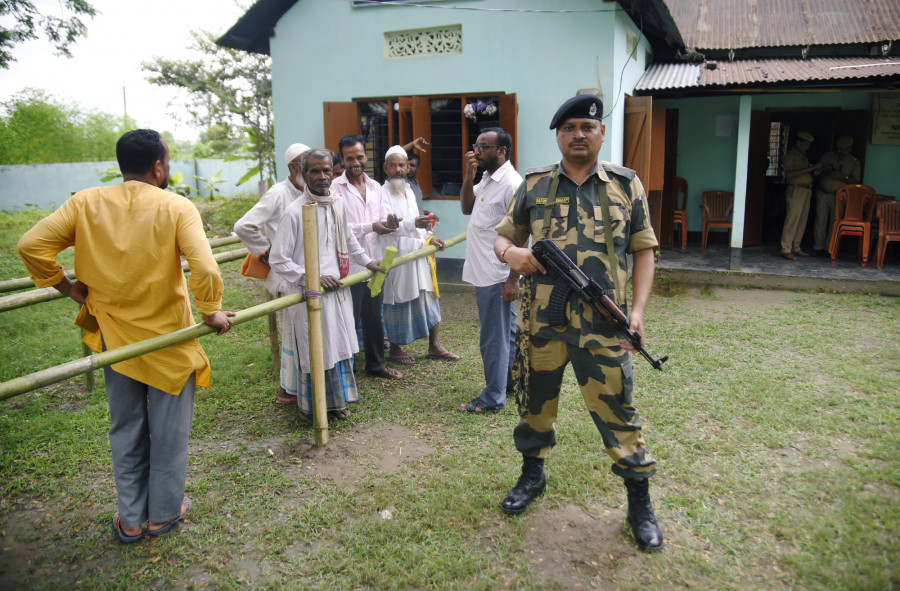India’s citizenship check exercise excludes nearly 100,000 Nepali-speaking people in Assam

Around two million people in the northeastern Indian state of Assam could become stateless after being excluded from the National Register of Citizens, in a gargantuan citizenship check exercise, backed by the Hindu nationalist government led by Narendra Modi. Among them are about 100,000 Nepali-speaking people, who, according to officials, could be included in the world’s largest-ever instance of forced statelessness.
Although Indian authorities have said those excluded from the National Register of Citizens—the government defines it as a list of “genuine” citizens—will not immediately be declared foreigners and that they will have 120 days to file an appeal, it is not clear what will happen if they lose the appeal. Assam is home to 35 million people.
RP Sharma, the chairperson of the Assam Gorkha Conference, said that the list discriminates against Nepali speakers and other indigenous Indians.
“The list is discriminatory and faulty,” Sharma told the Post over the phone. “We appeal to the government to immediately correct it.”
Nepali speaking people in Assam are largely known as Gorkhas, as most are descendants of soldiers recruited by the Assam Rifles in 1835. According to estimates, there are some 2.5 million Gorkhas in Assam.
The Gorkha organisation said even the families of the first woman martyr of the Assam Movement have been excluded, which has baffled the community. In the 1980s, Assam saw “an anti-foreigner” movement, which has come to be known as the Assam Agitation.
Championed by the All Assam Students Union and the All Assam Gana Sangram Parishad, the movement spearheaded protests and demonstrations targeted at illegal immigrants, seeking to expel them. Baijayanti Devi, a Nepali-speaking Assamese, was killed during the riots. The Assamese revere Devi as a martyr. Devi’s sister, Manju and her family have been excluded from the national register.
According to Assam-based journalist Rohit Gautam, it’s mostly the elderly population over 70 years of age who have been left off the list. The number of women excluded is also high.
To be included in the register, the government requires documentation from residents proving they were legal citizens before 1971.
“Most people have been excluded because they couldn’t prove their citizenship by descent,” said Gautam. “But some have faced exclusion owing to the negligence and prejudice of officials.”
Most Nepali speakers, however, have valid voter identity cards that they have been using every four or five years, and yet, they find themselves excluded for lack of citizenship by descent documentation.
“The Assam government is setting up Foreigners’ Tribunals to deal with those excluded. They can petition the tribunal for inclusion,” said Gautam. “It is believed that most of those who claim their inclusion with the tribunal will be included in the final register.”
The National Register of Citizens is a list designed by the government to identify “genuine” Indian citizens. It was first published after the 1951 census and since then had not been updated. The register aims to expel illegal immigrants, primarily from Bangladesh, who entered the state of Assam after theIndia-Pakistan war of 1971.
This, however, is not the first time that Nepali speakers in Assam have found themselves labelled “foreigners”. Assam’s government has time and again deemed Nepali speakers “suspicious” and “D-voters (dubious or doubtful voters)”.
The discriminatory behaviour dates back at least two centuries, according to Shivanath Sharma, former dean and professor of Guwahati University.
“We have been in India for over 200 years,” said Sharma. “But the Indian state still views us with suspicion and doesn’t consider us Indians.”
Nepali speakers in other Indian states such as Manipur, Nagaland, Arunachal and Darjeeling, also feel distrusted and insecure, according to Sharma. “The constitution considers us equal to any other Indian citizens,” Sharma said. “But we have been deprived of that right.”
In view of the Lok Sabha elections in April-May, the central Home Ministry had issued a directive to the Assam state government stating that Nepali-speaking people were not foreigners but Indians, and to not view them with suspicion. That had given the Gorkhas a ray of hope. But when the final list was out, according to Prem Tamang, chairperson of the All Assam Gorkha Students’ Union, the “discriminatory stance” of registry officials was obvious.
“We are planning demonstrations and demanding inclusion,” said Tamang.
When officials had called applications for the national register, most of the Nepali speakers in Assam had submitted their “grazing permits” and land ownership certificates. But the register did not consider those certificates adequate proof of citizenship.
Now with statelessness staring at around two million people, rights campaigners have warned of a humanitarian crisis. There are chances that many will end up in detention centres that the government has been building.
“It’s unfortunate that so many Nepali speakers are excluded from the list,” said Kishore Upadhyay, Assam state secretary for the ruling Bharatiya Janata Party.
According to him, out of the nearly 100,000, about 30,000 are at risk of never being on the list.
“Those 30,000 do not have the necessary documents,” Upadhyay said. “These people also have their Nepali certificates. Those who have been living here since before 1971 won’t face any problem. Those who have migrated after 1971 will face difficulties.”
But many Nepali speaking people in Assam say authorities have grossly misunderstood or refused to understand the actual scenario, largely due to centuries-old prejudices.
Munish Tamang, national chair of the Indian Gorkha Association, an organisation working for the rights of Gorkhas, said that the exclusion of Gorkhas from the recently published register is a manifestation of that age-old discriminatory stance.
“We speak Nepali but that doesn’t mean we come from Nepal,” said Tamang. “This is where the Indian state gets us wrong.”